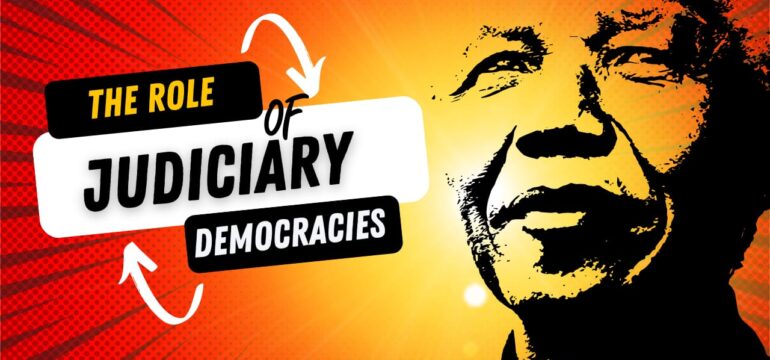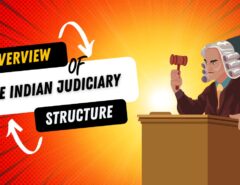Judiciary in Democratic societies place a strong emphasis on a system of governance based on the rule of law. These societies make it relatively easier to ensure justice for their citizens. The judiciary is often considered the guardian of democracy, establishing an inherent connection with other institutions within democratic societies. Key attributes of a democratic society include freedom of speech and expression, protection of minority rights, fair and transparent elections, access to information, the administration of justice, and upholding the rule of law. This unit specifically explores the role of the judiciary in democratic societies, focusing on the context of India.
There is a progression from formal, representative democracy to a modern interpretation known as substantive democracy. Substantive democracy places significant emphasis on the protection of human rights. Such protection cannot solely rest with the executive and legislative branches, as their decisions often reflect transient majority opinions. Consequently, the role of the judiciary becomes crucial in a modern democracy. Complex cases provide an opportunity for judges to exercise their discretion. Differing educational backgrounds and perspectives on the world can lead to variations in judges’ opinions. The existence of ideological diversity among judges is a defining characteristic of democratic societies.
The judicial role undergoes transformations due to the intricate nature of its responsibilities. Various legal frameworks, such as legal realism, positivism, the natural law movement, legal process movement, critical legal studies, and the integration of other intellectual disciplines into law, offer new tools to comprehend the complexities associated with the judicial role.
Moreover, in an era of globalization, it becomes necessary to consider ideals and thoughts that transcend national boundaries and legal systems. Since the aftermath of the Second World War, there has been an increasing expectation placed upon the judiciary. This development prompts discussions on judicial activism, judicial self-restraint, the theory of separation of powers, and other related concepts. Additionally, the threat of terrorism poses challenges to democracy, leading states to transition from passive democracy to defensive democracy.
Pre-Conditions for Judiciary to Play a Key Role in Democratic Societies:
Independence of Judiciary:
The independence of the judiciary refers to the ability of judges to perform their duties without interference from external influences. It encompasses both personal and institutional independence. Personal independence means that judges are free from any external pressures or influences that may compromise their impartiality or decision-making. Institutional independence, on the other hand, pertains to the autonomy of the judicial branch as a whole, ensuring that it is separate from the executive and legislative branches of government. This independence is crucial to ensure that judges can uphold the Constitution and democracy without fear of reprisal or favoritism.
Judicial Objectivity:
Judicial objectivity refers to the impartial and unbiased approach taken by judges when adjudicating cases. It requires judges to base their decisions solely on the facts presented, the applicable laws, and legal principles, without being swayed by personal beliefs, preferences, or external influences. By exercising objectivity, judges can ensure fair and equitable treatment for all parties involved, promoting the principles of justice and the rule of law.
Absence of Bias:
The absence of bias is closely related to judicial objectivity. It means that judges must be free from any preconceived notions, prejudices, or favoritism towards individuals or groups involved in a case. Judges are expected to treat all parties equally, regardless of their social status, background, or any other characteristic. This pre-condition ensures that the judiciary operates in a manner that upholds the principles of equality and non-discrimination.
Public Confidence:
Public confidence in the judiciary is essential for its effective functioning in a democratic society. It refers to the trust and belief that citizens have in the judiciary’s ability to deliver justice impartially, fairly, and in accordance with the law. To maintain public confidence, the judiciary should be transparent, accountable, and demonstrate integrity in its decisions and actions. When the public has confidence in the judiciary, it reinforces the legitimacy and authority of the legal system.
Faith in Judges:
Faith in judges goes beyond public confidence and pertains specifically to the trust and belief citizens have in the individual judges themselves. It involves having faith that judges will uphold their ethical obligations, exercise their powers judiciously, and make decisions based on their knowledge, experience, and expertise. Faith in judges strengthens the overall credibility of the judiciary and reinforces its role as an impartial arbiter in democratic societies.
By ensuring the pre-conditions of independence of the judiciary, judicial objectivity, absence of bias, public confidence, and faith in judges, the judiciary can effectively uphold the rule of law, protect individual rights, and play a key role in preserving democratic principles and institutions.
Relationship between judiciary and other branches of Government
Relationship between Judiciary and Other Branches of Government:
The judiciary and other branches of government often experience a constant tension due to the specific role assigned to the judiciary, particularly in terms of reviewing executive or legislative actions. The exercise of judicial review by the judiciary can sometimes frustrate the political goals set by other branches. How should the judiciary respond to these challenges and exercise their review power?
Safeguarding Constitution and Democracy:
The power of judicial review is intended to safeguard the Constitution and democracy. When exercising this power, the judiciary should do so with objectivity. Even when there are changes in the composition or jurisdiction of the court, the judiciary is expected to maintain the same level of objectivity. Acting objectively increases the level of public confidence in the judiciary.
Importance of Tension for Judicial Integrity:
The tension between the judiciary and other branches of government is a natural and necessary one. This tension helps to uphold the integrity of the judiciary. Without such tension, there may be speculation that the judiciary is acting in alignment with the executive or legislature due to quid-pro-quo arrangements. Therefore, the tension serves as a check on the judiciary and ensures its independence.
Criticism and Accountability:
Critics argue that the judiciary owes no accountability to anyone, unlike the other organs of government. In many democratic societies, the judiciary is not elected but appointed. They either have no constituency or have a limited one. Although this criticism is harsh, it plays a role in holding the judiciary accountable and encourages them to act with restraint and objectivity. Acting objectively and in accordance with the law increases public confidence in the judiciary.
Factors Influencing the Relationship between Judiciary and Other Branches of Government:
Several factors influence the relationship between the judiciary and other branches of government. These factors include:
Attitude towards the State
Separation of powers
Rule of law
Activism and self-restraint
By considering these factors and maintaining a delicate balance between the judiciary and other branches of government, the judiciary can effectively fulfill its role in upholding the rule of law and preserving democratic principles.
The judiciary plays a crucial role in restoring the constitutional balance envisioned by the theory of separation of powers. By acting as a check on the executive and legislature through judicial review, the judiciary ensures that no branch becomes absolutist in its sphere. Such absolutism would undermine the freedom that forms the foundation of the separation of powers. Accepting separation of powers in its true perspective is essential to prevent tension among the branches of government.
The concept of the rule of law has varied interpretations. In its formal sense, it implies rule by law, but this understanding falls short as it disregards the quality of the laws governing governance. Even dictatorial regimes can claim to be governed by law, as seen in the example of the Nazis administering Germany in accordance with the law. Thus, it becomes necessary to enrich the rule of law with substantive additions. This includes the pursuit of social justice based on public order, striking a balance between social equality, political independence, economic development, and internal order while safeguarding personal liberty and the dignity of individuals.
The complexities of judicial activism and self-restraint can be better understood by examining six parameters put forth by Professor Bradley Canon. These parameters include the willingness of judges to invalidate policies determined through democratic procedures, their readiness to change existing judicial rulings, their departure from the intentions of the Constitution’s authors and the clear language of the text, the extent to which courts determine policy beyond protecting democratic processes, their involvement or delegation of policy determination to the executive or individuals, and the degree to which judicial decisions supplant the considerations of other government branches. Evaluating the role of the court in a democracy should focus not only on action but also on the underlying thought process guiding its actions.
Power of judicial review
udicial Review of Statutes:
The power of judicial review, which allows the judiciary to examine the constitutionality of statutes, is present in many post-World War II Constitutions. Even in cases where no explicit provision exists, courts have recognized the implied power of review. Counterarguments against judicial review may lack sustainability as long as it maintains public confidence.
The exercise of judicial review creates not only tension but also a dialogue between the judiciary and the legislature. This can occur when the judiciary declares a statute unconstitutional or interprets it in a manner not intended by the legislature. In response, the legislature may introduce amendments or replace the statute entirely. The Shah Bano case serves as an example of this dynamic. In that case, the Court held that maintenance provisions in the Code of Criminal Procedure apply to divorced Muslim women, thereby suggesting uniform application of criminal law to all citizens. The judgment sparked heated debate among the Muslim community and ultimately led to the enactment of the Muslim Women (Protection of Rights on Divorce) Act 1986. This case illustrates how a court’s verdict can be overridden by legislative action, though the new statute remains subject to judicial review.
Discussing judicial review of legislative actions is not meant to undermine the legislature’s democratically assigned role. Free and fair elections establish the majority rule, and undermining the legislature while overstating the judiciary’s role can be detrimental to democratic societies. The separation of powers is vital for maintaining a balance, and the judiciary may intervene to restore democratic values whenever lapses occur.
Judicial Review of Executive Actions:
The executive derives its authority from the Constitution and statutes. The scope of executive authority in the Indian constitutional scheme was elucidated in the Ram Jawaya Kapur decision of 1955. When executive actions are challenged, the judiciary can scrutinize their legality. Unlawful activities conducted by the executive cannot be permitted under the guise of lawfulness. Elected officials should be held accountable, and the appointment of public officials should undergo court scrutiny, ensuring individuals with impeccable integrity are appointed to such constitutional positions.
The judiciary serves as the professional interpreter of the Constitution and statutes, while the executive acts as the professional implementer. These roles are assigned in a democracy and should not be forgotten by judges, who must not shy away from their responsibilities.
Applying the test of reasonableness consistently to all governmental actions enhances public confidence. The standard of reasonableness is not determined by the judge but by the executive. In the Advisory Opinion on coal block allocation, the Court extensively examined reasonableness in relation to Article 14 of the Indian Constitution. The Court also introduced the concept of proportionality to assess the legitimacy of executive action. These measures serve as powerful tools in the hands of the judiciary to fulfill its role in a democracy.
Judicial Responses to Terrorism
Terrorism creates a challenging tension between the different pillars of democracy, namely those governing the state and the defenders of human rights. As observed, democracy sometimes faces restrictions in its fight against terrorism. However, the preservation of the rule of law and the recognition of individual liberties are vital aspects of its understanding of security, ultimately strengthening its core principles and enabling it to overcome difficulties.
The primary responsibility of managing this tension falls upon the legislature and the executive. However, their actions must be justified before the judiciary, as the judiciary holds the responsibility to defend and uphold democracy. Judicial decisions made during times of war, internal conflicts, or emergencies carry significant weight, necessitating careful consideration by judges. During the national emergency in India, the decisions of the Supreme Court, such as the Election case involving Smt Indira Gandhi and the ADM Jabalpur decision, were subject to critical evaluation to assess the role of the judiciary as guardians of the Constitution and democracy, with Upendra Baxi providing valuable analysis.
It is crucial not to affix a stamp of approval on unlawful laws or executive actions, as doing so would undermine the principles of the Constitution. Lord Atkin’s minority opinion during the Second World War emphasized the importance of judges in protecting individual liberties and ensuring that any coercive actions taken by the executive are justified by law. The laws in times of war should align with those in times of peace, preserving the pillars of freedom and liberty.
The struggle against terrorism may transform our democracy into a defensive democracy, but it is crucial to retain its democratic character. Judges in modern democracies must bear this in mind while fulfilling their judicial duties. Even when fighting the war against terrorism, a democratic state must operate within the framework of the law and adhere to its principles.
Democracies combating terrorism must strike a delicate balance. While protecting the security of the state and its citizens is essential, national security should never be a justification for compromising democratic values, individual rights, and liberties. The approach of the Supreme Court of India, particularly in upholding the Armed Forces Special Powers Act 1958 or the use of the Unlawful Activities (Prevention) Act 1964 with recent amendments covering operations against Naxalites, has faced criticism for potentially undermining the democratic balance.
To conclude
The judiciary plays a pivotal role in upholding democracy by serving as a vibrant institution. It carries the responsibility of safeguarding the Constitution and preserving the democratic spirit. Through the power of judicial review, the judiciary examines the actions of the executive and legislative branches to ensure democratic governance. Upholding accountability and independence is vital for the judiciary in fulfilling its role. It is the duty of the other branches of government to guarantee the judiciary’s independence. Furthermore, democracy is an ever-evolving and reforming process, and the judiciary plays a crucial part in this journey. The doctrine of basic structure, as established in the Keshavananda Bharati case, holds significant importance in maintaining and developing democracy. Additionally, conducting free and fair elections is an integral part of the democratic development process. Together, these factors emphasize the essential role of the judiciary in preserving and advancing democracy.




Leave a Reply